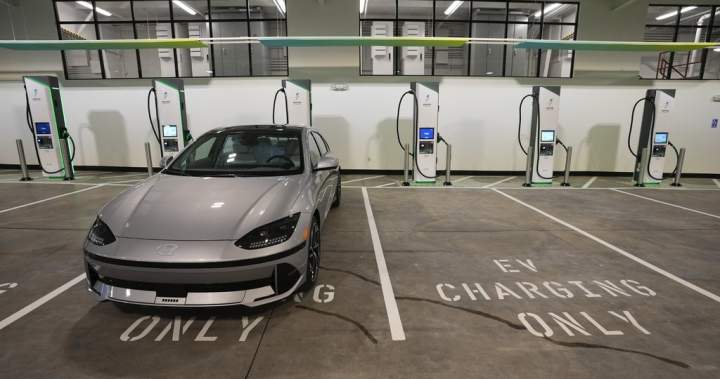The provincial government’s ambitious electric vehicle mandate is facing mounting resistance from British Columbians, with a new poll revealing that nearly half of residents now oppose the policy. This growing pushback comes as the province pushes forward with regulations requiring all new cars and trucks sold in BC to be zero-emission by 2035.
According to a recent survey conducted by Research Co., 48% of British Columbians now oppose the electric vehicle mandate, marking a significant 7-point increase from just one year ago. The poll found opposition is particularly strong among residents outside the Lower Mainland, where concerns about infrastructure, vehicle range, and affordability have intensified.
“What we’re seeing is a widening urban-rural divide on this issue,” explains Dr. Jennifer Walsh, transportation policy expert at the University of British Columbia. “While Vancouver residents might have easy access to charging stations and shorter commutes, those in northern and interior communities face very different challenges with electric vehicles.”
The provincial mandate, part of BC’s CleanBC climate strategy, established a graduated approach requiring 26% of light-duty vehicles sold to be zero-emission by 2026, 90% by 2030, and 100% by 2035. However, critics argue the timeline is unrealistic given current technological limitations and economic realities.
“The government is putting the cart before the horse,” said Michael Thompson, spokesperson for the BC Automobile Dealers Association. “Consumers want choice, and right now, many simply don’t see electric vehicles as viable options for their lifestyle or budget. Forcing this transition without adequate infrastructure or affordable options risks significant backlash.”
The poll also revealed interesting demographic patterns, with 58% of respondents over 55 expressing opposition to the mandate, compared to 39% of those between 18-34. Political affiliation also played a significant role, with BC Conservative and BC United supporters showing the strongest resistance at 72% and 65% respectively, while 62% of BC NDP supporters remain in favor of the policy.
Premier David Eby has defended the mandate, pointing to BC’s leadership in EV adoption across North America. “We’re building a cleaner future while creating economic opportunities,” Eby stated during a recent press conference in Victoria. “The transition to zero-emission vehicles is essential for meeting our climate goals and positions BC at the forefront of this growing industry.”
However, the economic argument hasn’t convinced many British Columbians worried about affordability. Despite federal and provincial rebates of up to $9,000 for qualifying vehicles, the average electric vehicle still costs significantly more than comparable gas-powered models. For many working families facing rising housing costs and inflation, the premium remains prohibitive.
The polling data suggests the government faces a challenging road ahead as it implements the mandate. With opposition growing, particularly in regions crucial for the NDP’s electoral success, there may be political consequences if concerns about practicality and affordability aren’t adequately addressed.
As this debate intensifies across the province, the fundamental question remains: can government mandates effectively drive technological adoption, or should consumer choice and market forces determine the pace of our transition to electric vehicles?










